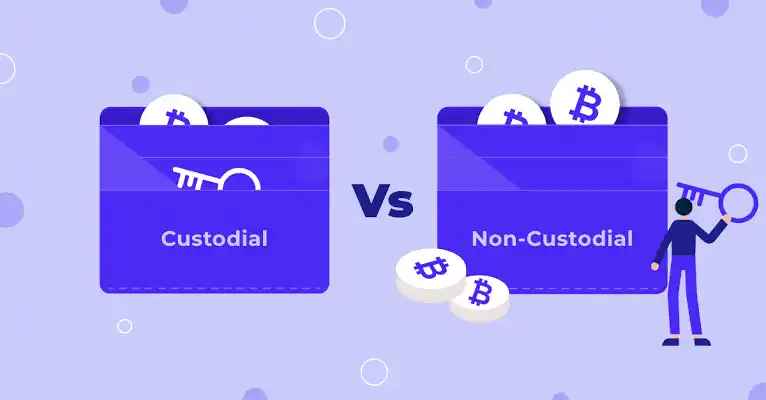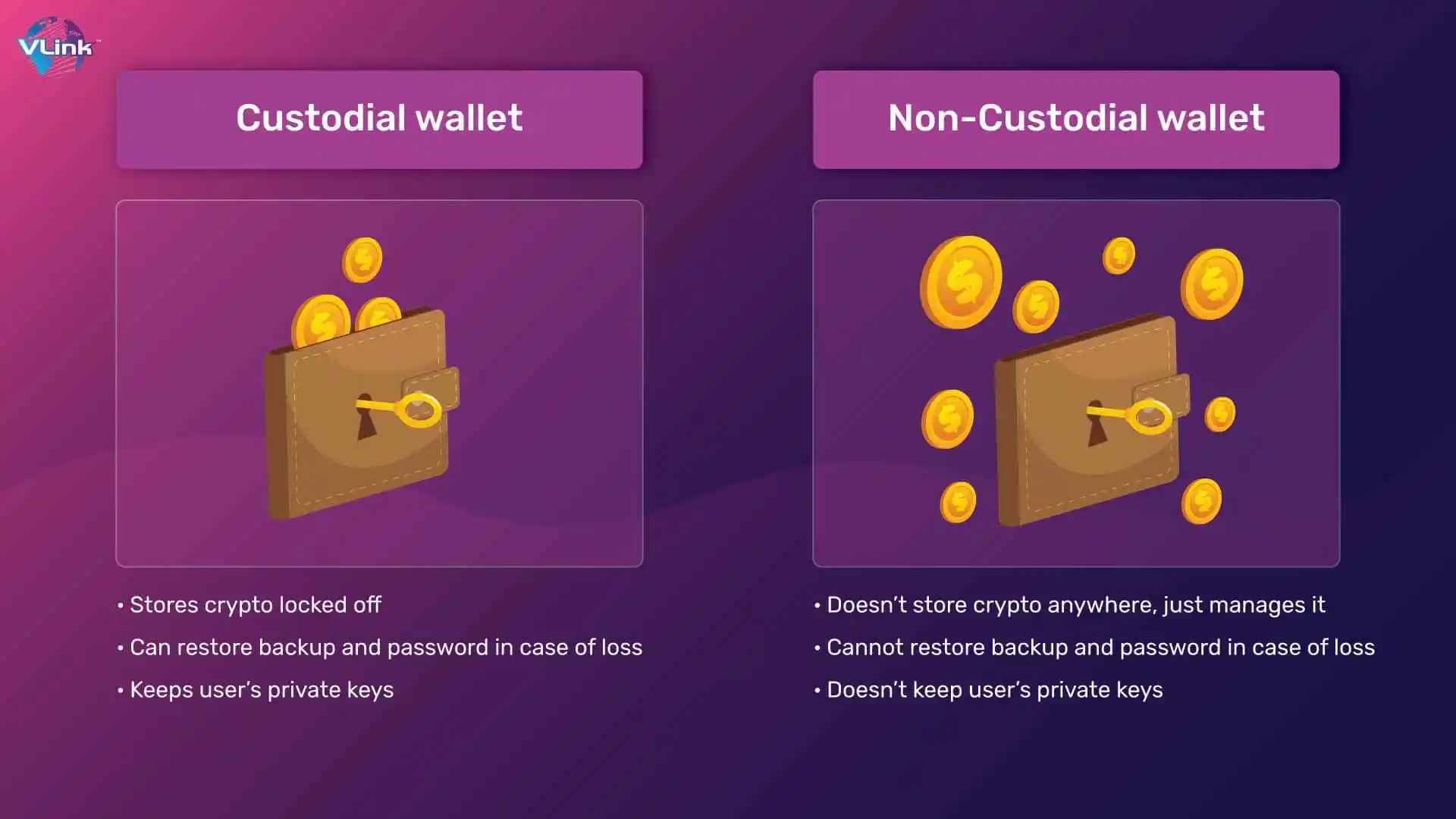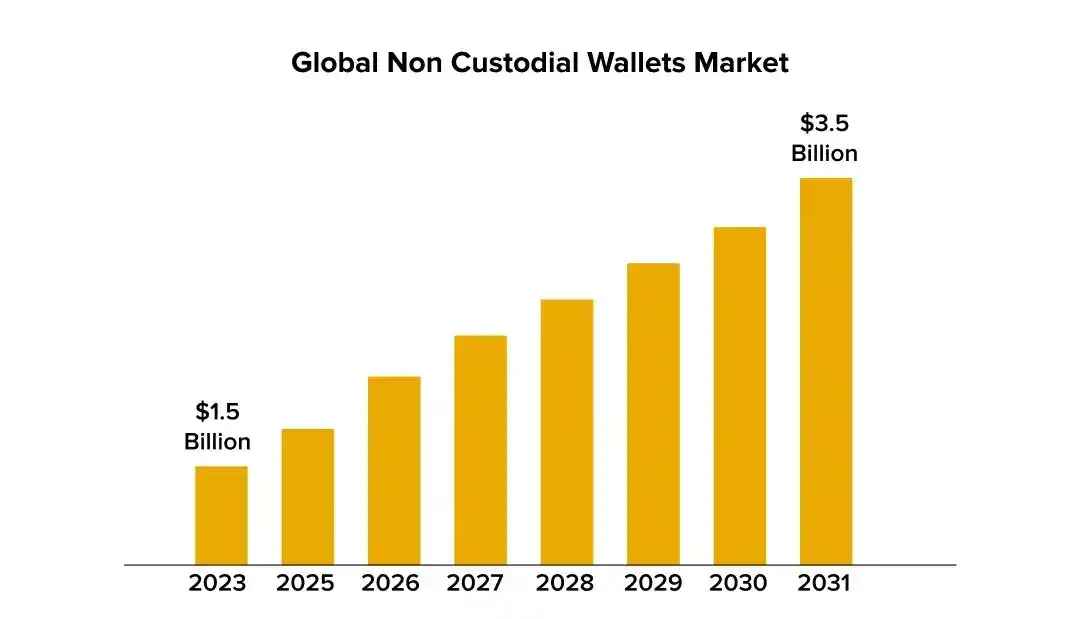Custodial vs. Non-Custodial Wallets: A Secure Build Guide
Updated on : 10 March, 2025

Image Source: facebook.com
Table Of Contents
- 1. What is a Custodial Wallet?
- 2. What is a Non-Custodial Wallet?
- 3. What Is The Difference Between Custodial And Non-Custodial Wallet?
- 4. What Are The Benefits And Limitations Of Custodial Wallets?
- 5. What Are The Benefits And Limitations Of Non-custodial Wallets?
- 6. How to create Crypto Currency Wallet?
- 7. Custodial and Non-Custodial Wallets
- 8. Core Features of a Non-Custodial Wallet
- 9. Step-by-Step Guide to Building a Non-Custodial Wallet
- 10. Things to consider for maintaining the security of the crypto wallet
- 11. How to Choose Between Custodial and Non-Custodial Wallets
- 12. FREQUENTLY ASKED QUESTIONS
- 13. Ending Thoughts
Table Of Contents
What is a Custodial Wallet?
A custodial wallet is a type of cryptocurrency wallet where a third party holds your private keys. Think of it like a bank account: the bank (the custodian) holds your money and manages the security, while you access your funds through their services. Popular examples include wallets offered by centralized exchanges like Coinbase, Binance, or Kraken. When you use a custodial wallet, you don't have direct control over your private keys; the exchange does.

Image Source: google.com
What is a Non-Custodial Wallet?
A non-custodial wallet puts you in complete control of your cryptocurrency. With these wallets, you own your private keys, which are essential for accessing and managing your crypto. This gives you full responsibility for the security of your funds. Examples include MetaMask, Trust Wallet, Ledger (hardware wallet), and Trezor (hardware wallet).
Know which Cryptocurrency Wallet is Better for You ?
What Is The Difference Between Custodial And Non-Custodial Wallet?
| Feature | Custodial Wallet | Non-Custodial Wallet |
|---|---|---|
| Control Over Funds | Held by a third party | Full user control |
| Private Key Access | Managed by provider | Managed by user |
| Security Risk | Prone to hacks of custodial platforms | Less risk, but requires personal security measures |
| Transaction Speed | May experience delays due to platform restrictions | Direct transactions on the blockchain |
| Recovery Options | Can reset passwords via provider | Requires secure backup of private keys |

Do you have a stellar idea for your Non-Custodial Wallet?
The primary difference lies in who controls the private keys.
- Custodial Wallet: The exchange or third-party service controls the private keys.
- Non-Custodial Wallet: You, the user, control the private keys.
This difference has significant implications for security, control, and responsibility.
How to create Crypto Currency Wallet?
-
Download & Install MetaMask
- Visit MetaMask and download the extension for Chrome, Firefox, or Edge.
- Alternatively, install the MetaMask mobile app (Android/iOS).
-
Create a New Wallet
- Open MetaMask and click “Create a Wallet.”
- Set up a strong password.
-
Secure Your Wallet (Secret Recovery Phrase)
- MetaMask will generate a 12-word Secret Recovery Phrase.
- Write it down and store it securely (never share it).
-
Confirm the Recovery Phrase
- MetaMask will ask you to verify the 12-word phrase in the correct order.
-
Wallet Setup Complete
- Your wallet is now ready! You can view your Ethereum address and start sending/receiving crypto.
-
Add Funds to Your Wallet
- Buy crypto using MetaMask or transfer from another wallet/exchange.
-
Connect to DApps
- Use MetaMask to log in and interact with decentralized applications (DApps) like Uniswap or OpenSea.
Custodial and Non-Custodial Wallets
Custodial Wallets (Managed by Third Parties)
- Binance Wallet – Integrated with Binance exchange for easy trading.
- Coinbase Wallet (Exchange Version) – Secure but controlled by Coinbase.
- Kraken Wallet – Offers exchange-based storage with security features.
Non-Custodial Wallets (Full User Control)
- MetaMask – Popular for DeFi & Ethereum-based assets.
- Trust Wallet – Supports multiple blockchains & tokens.
- Ledger Nano (Hardware Wallet) – Offline security for long-term storage.
What Are The Benefits And Limitations Of Custodial Wallets?

Image Source: google.com
Benefits
- Ease of Use: Custodial wallets are generally user-friendly, making them suitable for beginners.
- Recovery Options: If you forget your password, many custodial wallets offer account recovery options.
- Convenience: Easy to buy, sell, and trade crypto directly within the wallet.
Limitations of Custodial Wallets
- Centralized Target: Custodial wallets are a honeypot for hackers because they hold large amounts of cryptocurrency.
- Counterparty Risk: The exchange could be hacked, go bankrupt, or freeze your account.
- Lack of Control: You don't truly own your crypto; you're trusting the custodian to act responsibly.
- KYC Requirements: Custodial wallets usually require identity verification (KYC), sacrificing some privacy.
What Are The Benefits And Limitations Of Non-custodial Wallets?
Benefits
- Full Control: You have complete control over your funds and private keys.
- Enhanced Security: As long as you keep your private keys safe, you're less vulnerable to centralized attacks.
- Privacy: Non-custodial wallets often offer greater privacy, as they don't always require KYC.
- Access to DeFi: Essential for interacting with decentralized finance (DeFi) applications.
Limitations of Non-custodial Wallets
- Responsibility: You are solely responsible for securing your private keys. If you lose them, you lose access to your crypto.
- No Recovery: There's typically no "forgot password" option. Losing your seed phrase means losing your funds.
- Complexity: Can be more complex to use than custodial wallets, especially for beginners.
- Risk of Phishing: You need to be vigilant against phishing attacks and malware that could steal your private keys.
Core Features of a Non-Custodial Wallet
-
Private Key & Seed Phrase Management: You control your private keys and seed phrase. Securely store them offline and back them up to prevent loss.
-
Secure Transaction Signing: Your private key signs transactions, ensuring only you can approve transfers. This keeps your funds safe from unauthorized access.
-
Multi-Chain & Multi-Currency Support: Manage multiple cryptocurrencies and blockchains in one wallet, simplifying asset management.
-
dApp Integration & User Experience: Connect with DeFi, NFTs, and other blockchain services directly. A smooth interface ensures secure and easy transactions.
For the AR-VR Development Sevices
AR-VR bridges the gap between reality and imagination, creating immersive digital experiences like never before.
Step-by-Step Guide to Building a Non-Custodial Wallet
1. Choosing the Right Blockchain & Tech Stack
- Blockchain: Ethereum (DeFi), Bitcoin (secure transactions), Solana (fast & scalable).
- Tech Stack:
- Frontend: React Native / Flutter (mobile), React.js / Next.js (web).
- Backend: Node.js (if needed) with Web3.js, Ethers.js, or BitcoinJS.
- Storage: Secure Enclave (iOS), Keystore (Android), AES encryption.
For the Blockchain Development Sevices
"Blockchain: Secure, transparent, and decentralized—redefining trust in the digital world."
2. Private Key Generation & Storage
- Generate Keys: Use BIP39 for a 12/24-word seed phrase and BIP32/BIP44 for key derivation.
- Storage: Never store private keys on a server; keep them encrypted on the device.
- Backup & Recovery: Show a seed phrase for user-controlled recovery.
3. Secure Transactions & Smart Contract Interaction
- Sign Transactions Locally: Use Web3.js/Ethers.js to prevent key exposure.
- Broadcast Transactions: Send transactions via Infura, Alchemy, or QuickNode.
- Smart Contracts: Enable DeFi, NFTs, staking with secure contract interactions.
4. Security Best Practices & Compliance
- Security: Use end-to-end encryption, anti-phishing measures, and MFA (optional).
- Compliance: Follow GDPR & data privacy laws, optional KYC/AML for regulations.
- Testing: Conduct smart contract audits & penetration testing.

Looking to integrate blockchain solutions into your business?
Things to consider for maintaining the security of the crypto wallet
Securing your crypto wallet is crucial to protect your assets from hacks, scams, and unauthorized access. Here are the key security measures to follow:
- Use a Strong Password
- Mix uppercase, lowercase, numbers, symbols.
- Store safely with a password manager.
- Enable 2FA
- Use Google Authenticator/Authy, not just SMS.
- Secure Private Keys & Seed Phrase
- Never share them.
- Store offline in a safe place.
- Use a Hardware Wallet
- Keep long-term assets in Ledger/Trezor.
- Avoid Phishing Scams
- Check URLs, avoid unknown links.
- Use official sources only.
- Keep Software Updated
- Update wallets, firmware, antivirus regularly.
- Use Multi-Sig for Extra Security
- Require multiple approvals for transactions.
- Avoid Public Wi-Fi
- Use VPN for extra security.
- Backup Your Wallet
- Encrypt & store backups safely.
- Test Small Transactions First
- Double-check the recipient address.
Stay secure & in control of your crypto!
How to Choose Between Custodial and Non-Custodial Wallets
When selecting a crypto wallet, the choice between custodial and non-custodial wallets depends on factors like security, control, convenience, and responsibility. Here's a breakdown to help you decide:
1. Custodial Wallets (Centralized Control)
These wallets are managed by a third party (e.g., exchanges like Binance, Coinbase).
✅ Pros:
- User-Friendly: No need to manage private keys.
- Recovery Options: Can reset password if access is lost.
- Regulated & Secure: Often insured and compliant with security standards.
❌ Cons:
- Less Control: The provider holds your private keys.
- Security Risks: Susceptible to hacking if the provider is compromised.
- Withdrawal Restrictions: Some platforms limit transactions or impose fees.
Best for: Beginners, traders, and those prioritizing ease of use over full control.
2. Non-Custodial Wallets (Full User Control)
These wallets let you manage your private keys, giving full control over assets. Examples: MetaMask, Trust Wallet, Ledger, Trezor.
✅ Pros:
- Complete Ownership: You hold the private keys, so no one can freeze your funds.
- Enhanced Security: Less prone to centralized exchange hacks.
- No Third-Party Risk: No reliance on intermediaries.
❌ Cons:
- Irrecoverable Access: If you lose your private key/seed phrase, you lose access.
- More Responsibility: Requires careful management of security.
- Complexity: Not as beginner-friendly as custodial wallets.
- Best for: Advanced users, long-term investors (HODLers), and those who prioritize security over convenience.
FREQUENTLY ASKED QUESTIONS
Q: What is a seed phrase?
A: A seed phrase (or recovery phrase) is a set of 12-24 words that are used to recover your non-custodial wallet if you lose access to it. Treat it like the master key to your crypto and keep it extremely safe and offline.
Q: What is a private key?
A: A private key is a secret cryptographic key that allows you to access and control your cryptocurrency. Never share your private key with anyone.
Q: Which type of wallet is better?
A: It depends on your needs and technical expertise. Custodial wallets are easier for beginners, while non-custodial wallets offer more control and security for experienced users. A hybrid approach (using both types) can also be a good strategy.
Q: Can I use both custodial and non-custodial wallets?
A: Yes, many people use both types of wallets for different purposes. For example, you might use a custodial wallet for trading on an exchange and a non-custodial wallet for long-term storage and DeFi.
Ending Thoughts
Choosing between a custodial and non-custodial wallet is a crucial decision for anyone involved in cryptocurrency. Custodial wallets offer convenience but at the cost of control and increased risk. Non-custodial wallets empower you with full control but require a higher degree of responsibility. Understanding the trade-offs will help you select the option that best suits your individual needs and risk tolerance. Always prioritize security best practices, regardless of the type of wallet you choose.


